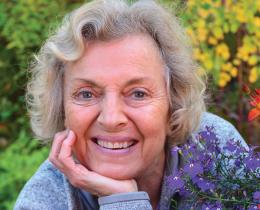Besides brushing your teeth, is there anything you’ve done faithfully, every day, for as long as you can remember? Be honest. (Okay, maybe you’ve skipped a few days of brushing here and there...we won’t tell.)
Keeping any commitment—not just a commitment to practice yoga—is difficult. Statistics show that fewer than 10% of people stick with their New Year’s Resolutions and nearly 50% of marriages end in divorce.
There are any number of theories as to why we don’t keep our promises, ranging from the power of our unconscious (and often contradictory) thoughts to our confusion around what commitment really means.
But what happens when you do keep practicing? What’s it like when you say you’re going to do yoga and then you show up, day after day, decade after decade, on the mat and in your life? These long-term yoga practitioners—some of our yoga elders—share a few of their most valuable lessons.
Practice Will Uncover Your Deepest Intention
Tao Porchon-Lynch discovered yoga in 1926 at the age of 8. That’s not a typo. This centenarian, who has been practicing yoga since before you were born, says that from an early age she realized her yoga practice was about more than the postures—it was also about a state of mind.
“Each morning I wake up and say to myself, “This is going to be the best day of my life,” Porchon-Lynch told ABC news. “Whatever you put in your mind materializes, so don’t materialize anything negative. Materialize the positive.”
Yin Yoga teacher Biff Mithoefer used to think the key to a committed practice was to find motivation and discipline, something he struggled to do. He was exposed to yoga at Woodstock in 1969 and practiced intermittently for about 30 years until he finally settled into a daily practice.
Over time he realized his intention for practice wasn’t helping. “I realized I was trying to push myself toward some different version of myself that I thought I should be,” he told Omega.
As he was sitting in meditation one day, he realized that perhaps he might think about his practice differently.
“I thought of why I spend time with the people I love and realized I don’t spend time with them because I want them to be different. I also don’t need to be motivated to hang out with them. I spend time with them because I want to be with them.”
He wondered what would happen if he took that approach with himself. He tried it and it worked.
“Now, in the morning, I don’t think, 'I have to drag myself to my mat because that’s what’s best for me.' Instead, I think how happy it will make me to spend some quiet time with my friend Biff,” he said.
Listen to What You Really Want
Colleen Saidman says that working with attention has been key to her success in keeping a regular practice. She first encountered yoga in 1984 but didn’t commit to it more deeply until 10 years later, after a back surgery.
“Some days there are so many reasons to not step foot on the mat,” she told Omega. “And it is easy to conveniently convince ourselves that those reasons are valid. Since we are practicing an art form of training the mind, let’s start by noticing the trickery of the mind and roll out your mat anyway. You will rarely regret practicing and you will often regret not practicing.”
Colleen’s husband, Rodney Yee, has been practicing since 1980. He also thinks attention—in the form of listening—is key to continuing to show up.
“By listening to my body, mind, and heart there is a request that comes in loud and clear: practice, practice, and practice,” Yee told us.
What does Yee do when life gets busy and he’s pulled in a lot of directions?
“I remember that all those other things are impermanent and that I don’t know when this life cycle will end. Then I get a glimpse of how I should prioritize my day and it makes my mat and the yoga that happens there an indispensable part of every 24 hours,” he said.
Letting Go & Discovering the Subtleties of the Path
As the decades pass and experience accumulates, the physical body also changes and often a practice needs to change to accommodate that.
Both Beryl Bender Birch and Rodney Yee have grown to appreciate the more subtle aspects of the path as they age.
Yee explained, “Now that I have many years of yoga under my belt it becomes so sweet and subtle. Small articulations and deep relaxations create such a fine flow of prana coursing through the body.”
For Birch the practice has become less about the latest trend, like taking a class with goats or beer, and more about going inside (though she admits she loves goats and thinks it’s great if that’s what it takes to get people in the door).
“Eventually, you get rid of all the peripheral entertainment that is required to keep you interested, and you learn to focus. You learn that yoga is about learning to pay attention,” she told Omega.
“Practice takes us from a goat-level of awareness to ever-increasingly subtle levels of consciousness where you realize that it’s just more fun and joyful to sit silently and have insight about the nature of being than to do yoga with goats and music.”
If you think you’re too old to start a practice now, take a cue from Porchon-Lynch, who took up ballroom dancing at age 87. She says, “I don’t believe in age. I don’t want anybody to tell me what I can’t do. I know that within me is all the power in the universe. It’s inside of us. If I can tune in to that which is in me, then there’s nothing I can’t do.”








